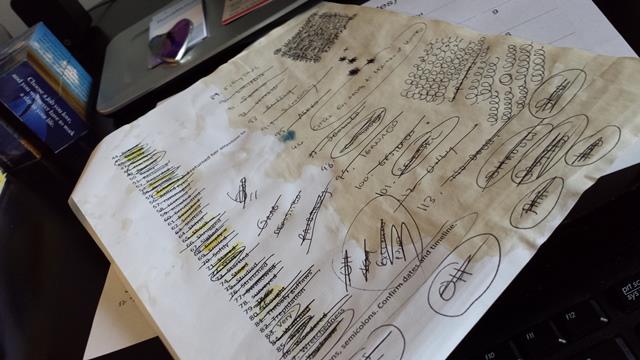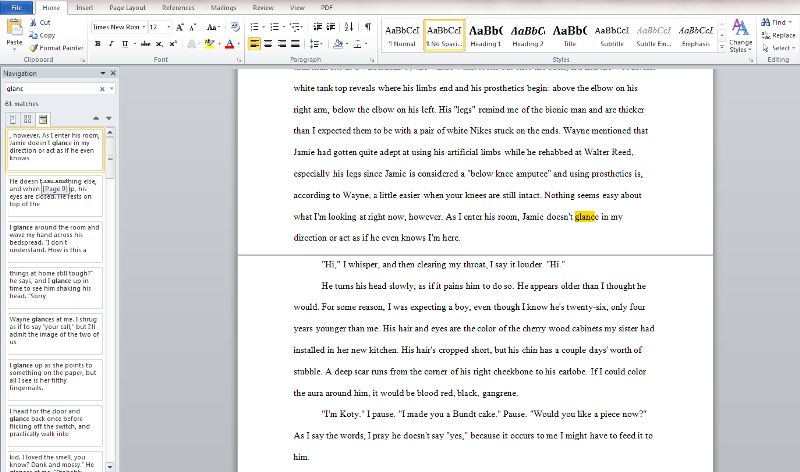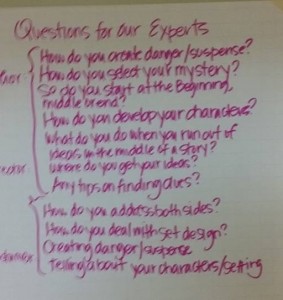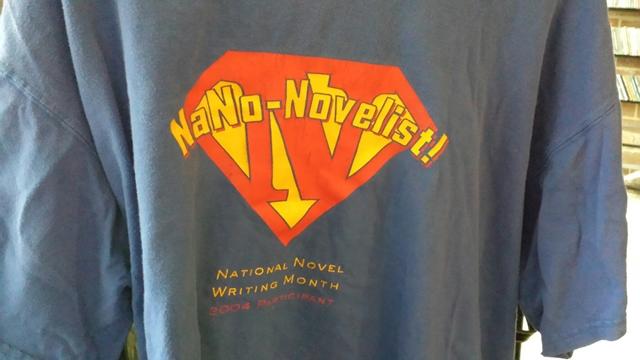Disclaimer: I wrote this post in bits and spurts during my viewing of the entirety of Breaking Bad. Bottom line: I loved the pilot and season one. I stuck with it through seasons two and three, struggling a bit during season three. Seasons 4 and 5 exceeded my expectations and kept me riveted, mostly because the story had morphed into true thriller territory. The last couple episodes of the final season were brilliant, and the finale was the best one I can remember. I haven’t stopped thinking about Walt and company, which says a lot. I have a feeling I will watch this series again, and I’ll probably fall more in love with the earlier seasons as a result.
But my missive below has to do with character motivation, specifically Walt’s (or his lack thereof), which I DO have a problem with, on some level, even now. This isn’t meant to impugn the show, show runner Vince Gilligan, or the actors. It was an excellent series, deserving of its many accolades, and it’s definitely one to study. It’s for this reason I offer my critique. Which is just that: a critique. My own personal opinion.
Let’s get to it…
I finally signed up for Netflix and binged on Breaking Bad, the show EVERYONE kept saying is the best written show on television and one every writer needs to watch. (This hype may have affected my viewing.) It is very good and the acting and cinematography are impeccable. Bryan Cranston and company deserve all the accolades they received. But I still think The Wire beats it.
I’ve been thinking a lot about this, and I think my biggest beef with Breaking Bad is the motivation (or lack thereof) for the show’s main character, Walter White. (Warning: spoilers ahead.)
For me, character motivation is everything. I can buy almost any situation a character ends up in, provided it makes sense to the character. (And if the situation is “out of character,” there needs to be a compelling reason for that as well.)
Walter White is incredibly unlikable, more so as each season advances. I have no problem with this, but I need to be able to understand the main character and, ideally, empathize with him on some level, even if he acts like a bastard from time to time (hello, Bill Masters in Masters of Sex) or a lot of the time (think Tony Soprano). I don’t need to like the character. But I need to understand where he or she is coming from, what motivates his or her decisions, why he or she acts in a certain way.
But Walt is so…hmm. How do I describe it? There’s a HUGE ego there. And arrogance. I have no problem with these character traits as long as I understand the evolution.
As far as I know, Walter is an only child (there’s no reference to siblings). It’s not until the 10th episode of season four (!) that he mentions his father, who died of Huntington’s disease when Walt was a child. And even then, we don’t get a sense of what that was like for Walt, how his childhood was affected, how (or if) he grieved, how close he was to his father, or what his father did for a living. Did the father leave his family destitute? If yes, THAT would explain SO much about Walt’s present-day character. Both Walt and Skyler allude to Walt’s mom being difficult. But what does that mean? Was she always like that?
The only things we know about Walt’s history:
- His mother is still alive.
- His father is dead (and died when Walt was a child), but this isn’t revealed until season 4
- He’s brilliant.
- He was in love with Gretchen.
- Walt, Elliott, and Gretchen founded Gray Matter.
- Gretchen jilted him for Elliott.
- Walter left the company and took his shares, worth $5000.
- The company today is worth billions (and, as a result, Walt wants an “empire” of his own — but we don’t learn this backstory until the final season, episode 6).
- Walt woos Skyler — who is over ten years his junior — when she’s a hostess at a restaurant. She does crosswords, and Walt starts coming in when’s she there and does crosswords too.
- Walt becomes a high school chem teacher.
- He has to work two jobs to support his family.
- The second pregnancy wasn’t planned.
- The pilot episode shows a man on the cusp of a mid-life crisis.
- When he’s diagnosed with terminal lung cancer, he’s freaked out about leaving his family with nothing, and he’s too proud to accept help.
OK…that last bullet point. I understand and accept the first part and can *sort* of understand the second. But it would be helpful to know more about who Walt is (as in, what’s the source of that pride?). I’m not talking a ton of backstory, either.
Take Jesse. We learn from a few deftly drawn scenes his situation with his family. He’s the disappointment. The kid who had everything but got involved with drugs and let his parents down. The parents love him but don’t know how to care for an addict. They have a second son and are DETERMINED to do it right this time. Jake (we only meet him in one episode) is the son of helicopter parents who make sure he’s pushing and challenging himself academically, musically, athletically. He’s a composed kid, although Jesse and the viewers discover Jake is experimenting with pot. The cycle continues. This was enough backstory to explain a whole helluva lot about who Jesse is.
Even Mike has a wonderful backstory moment that speaks volumes about him (when he explains to Walt how he used to be a cop and that he failed to protect a woman who was being beaten by her boyfriend…and that he’d never let a situation like that happen again). And, of course, we get the backstory on Gus as well — all in one scene.
But we never have these revealing moments with Walt.
And perhaps it wouldn’t bother me so much if it were just Walt. But four of the main characters have no backstory. We know nothing about Skyler beyond her desire to be a writer (the fact we never once see her writing, especially in the first season, bothers me). I’m assuming her parents are deceased because the show gives me no reason to believe otherwise. What sort of childhood did she and Marie have? What led Marie to become a kleptomaniac (something that’s never fully fleshed out)? And what about Hank? Are his parents deceased as well? Is he an only child, too? Again, just a little more insight into these characters’ backstories would help.
Here’s the thing: I’m pretty sure Vince Gilligan knows their backstories. Most likely inside and out. I don’t need to know everything. Just a bit. (EDIT: I was wrong. Vince didn’t know Walt’s backstory, which explains a lot. He says in this interview, “When I think back on Breaking Bad, I realize that I didn’t really understand Walter White’s character until season four,” he says with a tinge of amazement.”
And this article from The New York Times is also quite revealing: “When Gilligan declined to fill in large holes in Walter’s back story, Cranston sat down and wrote out one of his own. On a handful of occasions, he has flagged lines in the script that felt false to him… When he can’t resolve the issue with the writer on the set that week, a call is placed to Gilligan, who is usually in the writer’s room in Burbank. ‘It’s up to them, but I won’t bend unless I’m convinced it’s the right thing to do,’ Cranston says. ‘Convince me and I’ll do it. I have a theory — our job isn’t to lie to the audience, our job is to find the truth in the character.'”
To wit: think about how much more fully formed Tony Soprano is to viewers (as well as his therapist) after we learn how Tony, as a young boy, witnessed his father chopping off someone’s fingers? Or how Bill Masters’ father was an abusive drunk, forcing Bill to leave the house at a young age and become a self-made man who is always in control?
These insights don’t excuse the often reprehensible actions these men take, but they inform me as to why they take the actions, which allows me to “buy” their character.
Breaking Bad opens on Walter White’s 50th birthday. There’s a half century of character backstory, 99% of which we never learn, and this proves problematic. The characters who resonate with me the most — Jesse, Mike, even Gus — have some powerful backstory moments that reveal the character’s motivation and how they became the people they are.
And that’s the thing: our histories shape us. I’m still struggling to understand the source of Walter’s rage. I feel it must go much deeper than a jilted heart or losing out on a billion-dollar company. We never get the sense that Walt settled for Skyler, and he appears to genuinely love Walt Jr. and Holly. So while he lost out on the money, he has a decent life — at least it appears that way. I’m OK with appearances being an illusion, which they apparently are, at least to some extent, for Walt. But that means I need to understand Walt’s inner turmoil. I enjoyed the pilot immensely. I “bought” Walt’s crazy idea to sell meth since he saw it as a quick way to get the cash for his family. But everything that happened after that — again, those rage-filled moments, like when he set that asshole guy’s car on fire at the gas station — I didn’t fully buy the pent-up rage. And I wanted to. I really did.
Walt is an incredibly selfish man. Everything that motivates him goes back to him. It’s never been about his family. It’s been about him, always him (something he owns up to in the final episode, although viewers — at least, this viewer — made this realization long before Walt ever did).
Examples of this selfishness:
- When Walt tells Junior about Walt’s last image of his father on his deathbed, he goes on to tell Junior he doesn’t want Junior to see Walt like that. Again, that goes back to WALT’S need, not his son’s.
- When Walt lets Jane die, he doesn’t do it for Jesse, although it might look like that at first blush (e.g. knowing that if Jesse stayed with Jane, they would both end up dead). But Walt’s real motivation was the fact he needed Jesse. Again, it comes back to what’s good for Walt.
I have no problem with a selfish character. But what made this mild-mannered guy from the pilot episode transform into the completely selfish prick that he is by the final season? A cancer diagnosis doesn’t do it. And the “life of crime” that follows doesn’t do it either (I DO think the timeline in Breaking Bad is a stretch, but it’s fiction, so I’m willing to suspend my disbelief for things like that). So what does do it? We don’t ever know. And that’s the missing piece — a BIG piece.
Anyhow, those are my thoughts. If you got this far, thanks for reading. And feel free to share your thoughts in the comments.




